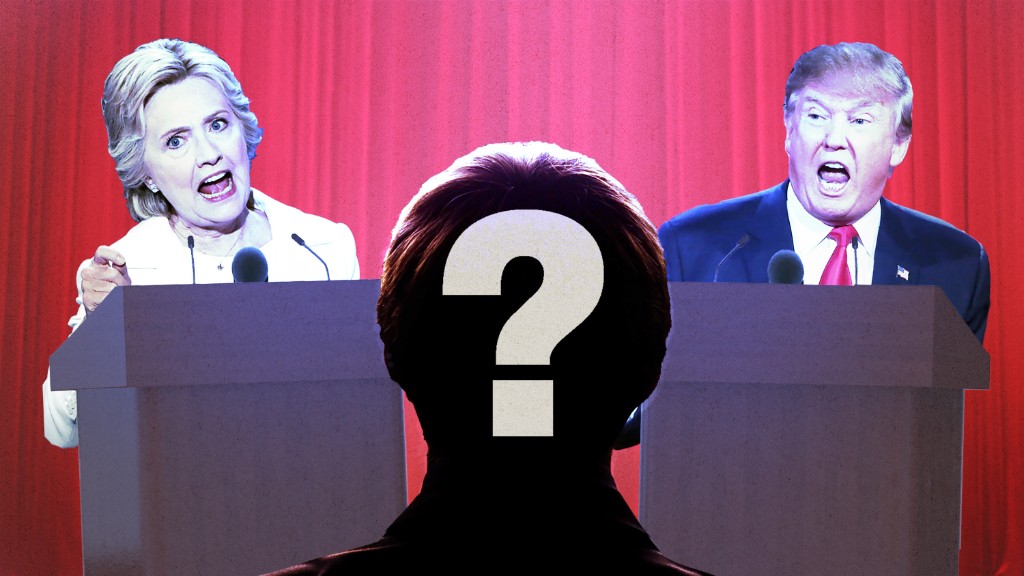
This year's three presidential debates will be moderated by NBC's Lester Holt, CNN's Anderson Cooper and ABC's Martha Raddatz, and Fox News Sunday host Chris Wallace.
The vice presidential debate moderator is Elaine Quijano of CBS News.
Holt, the anchor of the NBC Nightly News, will lead the first debate, which is set to take place at Hofstra University in Hempstead, New York, on September 26.
Cooper and Raddatz will co-moderate the second debate, which will be a town-hall style event at Washington University in St. Louis, Missouri on October 9.
Wallace will moderate the third and final presidential debate at University of Nevada in Las Vegas on October 19.
The vice presidential debate, moderated by Quijano, will take place at Longwood University in Farmville, Virginia, on October 4.
Steve Scully, a senior executive producer and political editor at C-SPAN, will serve as backup moderator for all the debates.
The debates will all run from 9:00-10:30 p.m. Eastern Time without commercial breaks.
The news was announced Friday morning by the Commission on Presidential Debates, the bipartisan committee that has sponsored and produced all the presidential and vice presidential debates since the 1988 campaign.
"These journalists bring extensive experience to the job of moderating, and understand the importance of using expanded time periods effectively," Commission co-chairs Frank J. Fahrenkopf, Jr. and Michael D. McCurry said in a statement. "We are grateful for their willingness to moderate, and confident that the public will learn more about the candidates and the issues as a result."
Brian Fallon, a spokesman for Hillary Clinton, said the campaign was "extremely grateful to the bipartisan commission for its continued work in preparation for the debates."
"Hillary Clinton is looking forward to participating in the debates, as she believes they are an important proving ground for anyone seeking to be Commander in Chief," he said. "Especially given that Fox has been selected to moderate a debate for the first time ever, it's time for Donald Trump to end his debate shenanigans and formally agree to debate."
The role of presidential debate moderator is among the most coveted assignments in political journalism, especially in this cycle when interest in the debates is likely to reach an all-time high.
The Commission had initially planned to announce moderators in late August, but held the announcement until September due in part to the unprecedented challenge of selecting individuals who were immune (or at least as immune as possible) to accusations of bias.
Related: Donald Trump and RNC attack presidential debate schedule
Trump made it more challenging than ever. The last thing the Commission wanted was for the moderator to become part of the story leading up to a debate. Yet Trump's aggressive attacks on the media and complaints about unfair treatment effectively guaranteed that the moderators would come under scrutiny from conservatives.
This made the Commission even more cautious than usual in researching potential moderators, sources said. The Commission feared that Trump would use even the slightest whiff of a pro-Clinton bias to attack a moderator and undermine his or her credibility.
Their efforts were complicated by the fact that Clinton has been a public figure for 30 years and has developed unique relationships with certain journalists.
Related: Debate Commission faces new challenge in selecting moderators
The commission sought candidates who -- in addition to being qualified and capable of moderating a debate -- have a reputation for being fair and evenhanded and have no record of controversy with either candidate.
"The job description is to be both a journalist, a moderator, and a circus navigator, I think. The job involves doing many things, which is why this is so difficult," former CNN Washington bureau chief Frank Sesno said on "Smerconish" last week.
"They have got to not be intimidated by cameras and knowing that maybe a billion people around the world are watching this thing. So there's a great deal of pressure and a great deal of sort of real-time thinking that goes into this job. Not everybody can do it," Sesno said. "Very few can, really."
The format for the four debates is as follows, per the Commission's press release:
The first and third presidential debates "will be divided into six time segments of approximately 15 minutes each on major topics to be selected by the moderator and announced at least one week before the debate."
The second presidential debate "will take the form of a town meeting, in which half of the questions will be posed directly by citizen participants and the other half will be based on topics of broad public interest as reflected in social media and other sources. ... The town meeting participants will be uncommitted voters selected by the Gallup Organization."
The vice presidential debate "will be divided into nine time segments of approximately 10 minutes each."
"The formats chosen for this year's debates are designed to build on the formats introduced in 2012, which focused big blocks of time on major domestic and foreign topics," Fahrenkopf and McCurry said.


